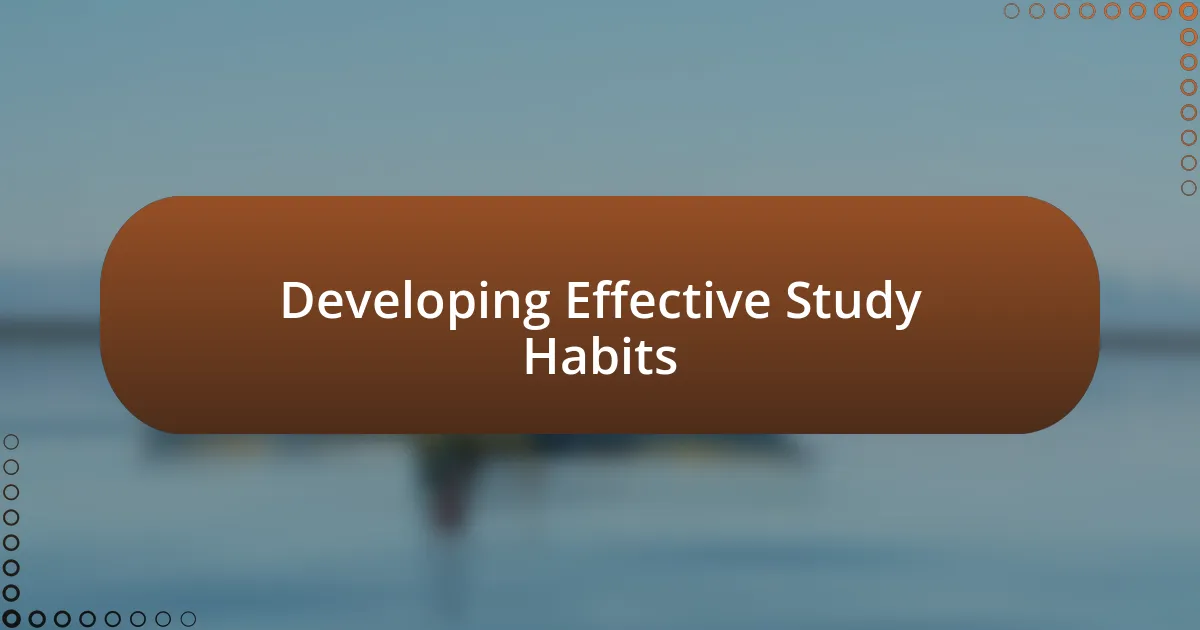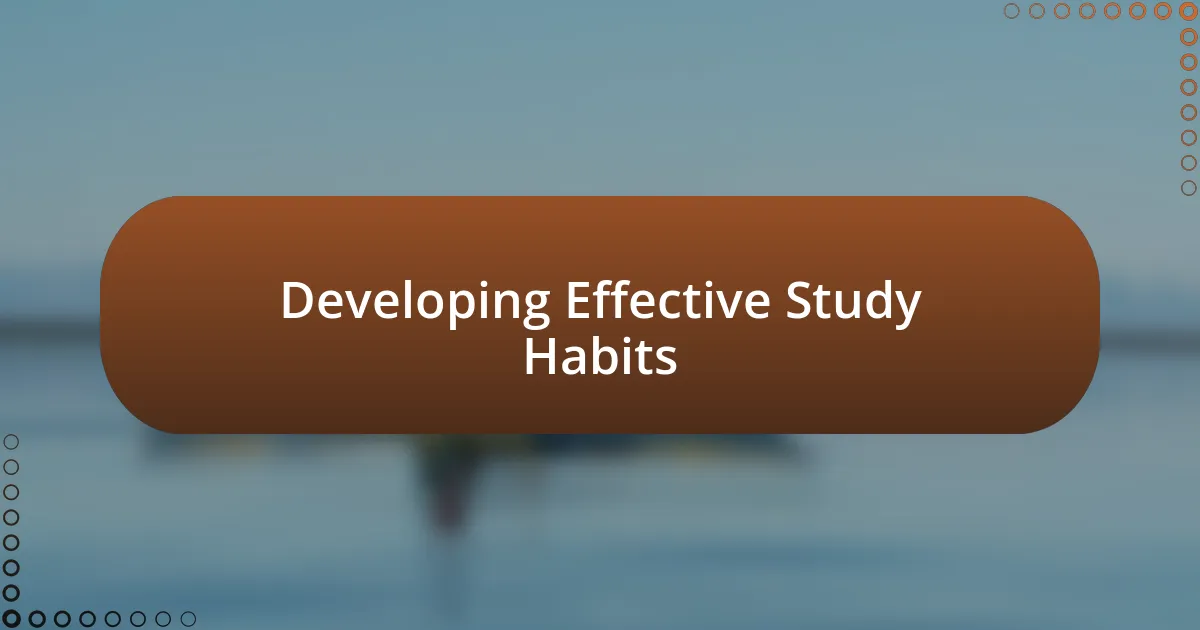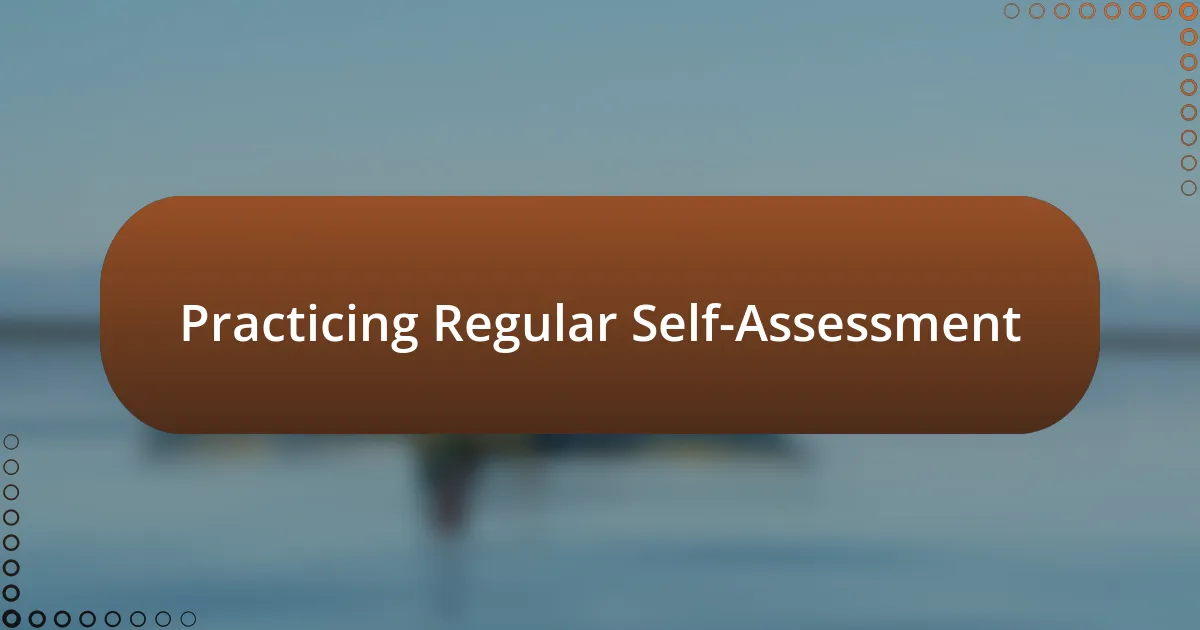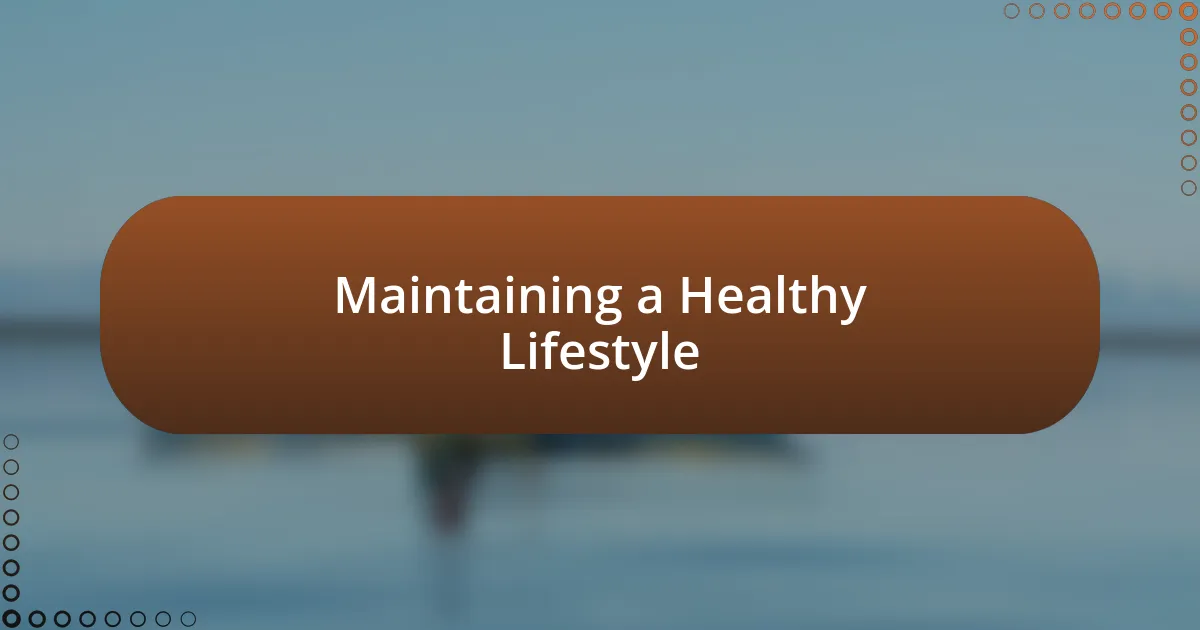
What I Do to Maintain High Scores
Key takeaways:
- Setting clear, passion-driven academic goals enhances motivation and creates a sense of purpose in studies.
- Establishing effective study habits, such as active note-taking and the Pomodoro Technique, improves focus and retention.
- Utilizing time management techniques like task breakdown and time blocking helps reduce stress and increase productivity.
- Maintaining a healthy lifestyle, including regular exercise, balanced nutrition, and adequate sleep, positively impacts academic performance.

Setting Clear Academic Goals
Setting academic goals is more than just jotting down what you want to achieve; it’s about envisioning your future and mapping out how to get there. I remember when I set a goal to improve my math grades. Instead of just saying I wanted to do better, I broke it down into specific targets, like mastering one new concept each week. This approach transformed my anxiety into excitement.
I often ask myself, what motivates me? It’s crucial to align your goals with your passions. For instance, I set a goal to read one academic book each month related to my field, which not only enriched my knowledge but also fueled my enthusiasm for learning. It’s amazing how clear, passion-driven goals can create a sense of purpose that is often missing in generic to-do lists.
The beauty of setting goals is in the clarity it brings to your academic path. When I created a visual chart of my goals, marking off achievements felt incredibly rewarding. Each tick mark didn’t just indicate progress; it sparked joy and a deeper commitment to my studies. Who doesn’t love that feeling of accomplishment, right?

Developing Effective Study Habits
Developing Effective Study Habits
Establishing effective study habits is like creating a personalized roadmap for your academic success. Over the years, I’ve discovered that consistent routines are invaluable. For instance, I always designate my study sessions in the early evening when my mind is fresh; I find that I’m more focused during these quiet hours compared to the chaotic energy of a busy afternoon. This habit not only streamlines my study process but also makes information retention much easier.
Incorporating specific techniques has also been pivotal in solidifying my study routine. Here’s what I’ve found effective:
- Set a designated study space: A clutter-free, comfortable environment helps me concentrate better.
- Use the Pomodoro Technique: Studying in short bursts of 25 minutes, followed by a 5-minute break, keeps my mind sharp and prevents burnout.
- Active note-taking: Instead of passively reading, I jot down key concepts, which enhances my understanding and recall.
- Review regularly: Setting aside time each week to revisit what I’ve learned reinforces my knowledge and helps uncover any gaps.
- Stay flexible: I adapt my habits based on what works best for me during different subjects or periods, understanding that one size doesn’t fit all.
These strategies haven’t just helped me maintain my grades; they’ve also deepened my appreciation for learning. When I reflect on the progress I’ve made over time, I feel a profound sense of satisfaction that makes all the effort worthwhile.

Utilizing Time Management Techniques
Utilizing time management techniques has been a game-changer in my academic journey. I remember a particularly hectic semester where my schedule was packed. I discovered that breaking down my tasks into smaller, manageable segments, and scheduling them on a planner, significantly reduced my stress levels and improved my productivity. This visual representation of my time made it easier to see what needed to be done and when, allowing me to prioritize my commitments effectively.
Another powerful technique I’ve embraced is time blocking. By assigning specific chunks of time for different subjects or projects, I found I could stay focused without feeling overwhelmed by a looming workload. For instance, I often block out hours in my week dedicated solely to math and sciences, knowing full well that various subjects require differing levels of concentration. This not only helps in maintaining a balanced approach but also fosters a deeper dive into challenging topics when I’m at my most alert.
Lastly, I can’t overstate the importance of setting boundaries. In my experience, saying no to distractions and establishing clear start and end times for my study sessions has increased my efficiency. I remember one time when I spent an entire afternoon scrolling through social media instead of studying, which left me feeling guilty and unproductive. Since then, I’ve learned to turn off notifications during study times and create a focused atmosphere, leaving me more confident in my scores and capable of achieving my goals.
| Time Management Technique | Benefits |
|---|---|
| Task Breakdown | Reduces stress and improves productivity by making tasks manageable |
| Time Blocking | Enhances focus and allows deeper study into specific subjects |
| Setting Boundaries | Fosters a focused atmosphere, increasing efficiency and confidence |

Leveraging Resources and Tools
Sometimes, I find that the right resources and tools can make all the difference in reaching high scores. For instance, I often rely on educational apps that turn studying into an interactive experience. Just last semester, I started using a flashcard app, and the improvement in my retention was noticeable. Have you ever tried quiz-based learning? It not only makes the process enjoyable but also reinforces concepts in a way that textbooks simply can’t match.
Along with apps, I’m an advocate for using online study groups. Collaborating with peers has been incredibly beneficial for me. During one particularly challenging course, we formed a virtual study group and used platforms like Google Docs for shared notes. This collective effort not only held me accountable but also exposed me to different perspectives and insights that I wouldn’t have encountered studying alone. Isn’t it amazing how a shared goal can amplify knowledge?
Lastly, I can’t stress enough the value of utilizing online resources, such as video tutorials or specialized forums. I remember struggling with a complex math problem, and a quick search led me to a YouTube tutorial that provided a fresh explanation. It was like a light bulb moment! The accessibility of a variety of teaching styles through these platforms can fill in gaps that traditional methods sometimes miss. Have you ever felt the satisfaction of finally understanding a tough concept through a simple video? It’s these tools that empower us to keep pushing towards our academic ambitions.

Practicing Regular Self-Assessment
Practicing regular self-assessment has been a game changer for me in maintaining high scores. I often sit down after finishing a chapter or a topic, asking myself questions like, “What did I understand well, and what remains unclear?” This reflective process not only helps me identify areas needing improvement but also boosts my confidence when I realize how much I’ve grasped.
I remember a time when I was preparing for a big exam and decided to create a mini-test for myself, mirroring the structure of the actual exam. The pressure felt real, and I could see my weaknesses in action. This exercise revealed just how unprepared I was in certain sections, motivating me to focus my study sessions more strategically. Have you ever felt that rush of urgency to improve after a self-assessment? It can be electrifying!
Moreover, sharing my self-assessment findings with a study partner has been incredibly valuable. When we discuss our strengths and weaknesses together, it fosters a supportive environment where I’m encouraged to push my limits. I can’t help but think about how accountability in these discussions propels me toward my goals. Have you tried teaming up in this way? It adds an element of community to the solitary path of learning.

Maintaining a Healthy Lifestyle
Maintaining a healthy lifestyle plays a crucial role in my academic success. I’ve discovered that regular exercise not only lifts my mood but also sharpens my focus. For instance, I often take short breaks to go for a brisk walk. Those moments away from my books leave me feeling refreshed and ready to tackle complex concepts. Do you find that physical activity boosts your mental clarity?
Nutrition is another pillar of my lifestyle that I prioritize. I make it a point to fuel my body with whole foods, like fruits, vegetables, and lean proteins. I still remember the time I switched to a balanced breakfast instead of sugary cereals. The difference was remarkable; I felt energized throughout my morning study sessions. Have you ever considered how your food choices impact your performance?
Sleep, too, is non-negotiable for me. I’ve learned the hard way what it’s like to burn the midnight oil and pay for it in the morning. Now, I ensure I get at least seven hours of quality sleep each night, which makes a world of difference in my retention and focus. The rejuvenation that comes from a good night’s rest is something I can’t overlook. Have you experienced the impact of sleep on your learning? It’s a game changer!

Staying Motivated and Focused
Staying motivated and focused is essential for achieving high scores. Personally, I find that setting specific, achievable goals keeps my momentum going. For example, when I prepare for exams, I break my study material into smaller sections. This approach helps me feel a sense of completion after finishing each section, reinforcing my motivation to continue. Do you find that small wins fuel your drive as well?
I also pay attention to my study environment. I’ve recognized that a clutter-free, organized workspace significantly enhances my concentration. When I clear my desk of distractions and keep only my study materials in sight, I feel more in control of my work. Have you noticed the difference a tidy space makes in your focus? For me, it’s transformative.
To stay consistent, I incorporate variety into my study routine. I allocate time for different subjects to keep monotony at bay. Last semester, I even experimented with study techniques like flashcards and group discussions. It was eye-opening to see how these methods not only made learning enjoyable but also deepened my understanding. What strategies do you use to keep your study sessions engaging?




